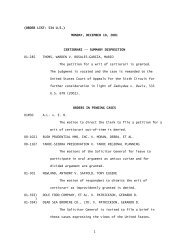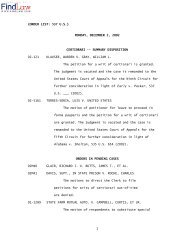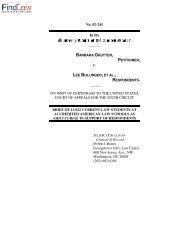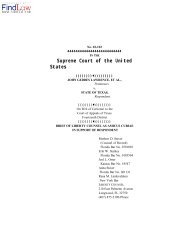No. 01-1757 Stogner v. California - FindLaw: Supreme Court Center
No. 01-1757 Stogner v. California - FindLaw: Supreme Court Center
No. 01-1757 Stogner v. California - FindLaw: Supreme Court Center
You also want an ePaper? Increase the reach of your titles
YUMPU automatically turns print PDFs into web optimized ePapers that Google loves.
20<br />
the crime of murder or the matters that might be pleaded<br />
as an excuse or justification for the conduct underlying the<br />
charge. The holding in Kring, then, could not stand. Id. at<br />
50.<br />
As an example of a case in which a defense could not<br />
be withdrawn without violating ex post facto principles,<br />
this <strong>Court</strong> cited United States v. Hall, 26 F. Cas. 84 (D. Pa.<br />
1809). Collins, 497 U.S. at 49. There, a vessel owner was<br />
sued by the United States for forfeiture of an embargo<br />
bond obliging him to deliver certain cargo. As a legal<br />
excuse, the defendant asserted that a severe storm had<br />
disabled his vessel and forced him to land in Puerto Rico,<br />
where he was forced by the Puerto Rican government to<br />
sell the cargo. The <strong>Court</strong> explained that according to the<br />
law in effect at the time Hall forfeited the cargo, an<br />
“unavoidable accident” was an affirmative defense to a<br />
charge of failing to deliver cargo. A later-enacted law,<br />
which imposed an additional requirement for the affirmative<br />
defense – that the vessel or cargo actually be lost at<br />
sea as a result of the unavoidable accident – would have<br />
deprived Hall of a defense of his actions available at the<br />
time he sold the cargo. It was, therefore, an invalid ex post<br />
facto law. Id. As this <strong>Court</strong> explained, a law that abolishes<br />
an affirmative defense of justification or excuse contravenes<br />
the Ex Post Facto Clause because it expands the<br />
scope of a criminal prohibition after the act is done. Id.<br />
The <strong>Court</strong> in Collins concluded that the Texas statute<br />
allowing reformation of improper verdicts did not withdraw<br />
a defense bearing on the “definition” or “elements” of<br />
the charged crime, or a defense involving “an excuse or<br />
justification for the conduct underlying such a charge.”<br />
497 U.S. at 50. Hence, the statute did not violate the Ex<br />
Post Facto Clause. Likewise, the withdrawal of a statute of






